So you’ve decided to become a youth football coach. Congratulations! Whether it be kids playing pee-wee or playing Saturdays and Sundays under the big lights, coaching football is a fantastic opportunity to impact young lives in a profound way. The first question you may be asking yourself: “Where do I need to start?”
Coaching youth football consists of the following factors; gaining experience, obtaining the relevant certification to coach at your desired level, building relationships, being granted a job and then structuring your practice and game-day so that you can succeed no matter the challenges thrown at your and the team.

These young athletes look to you as a role model, a leader. It’s essential that you lead them in the right direction.
This comprehensive guide will take complete beginners and get them ready for their first season and can serve as a great fundamentals refresher for more seasoned coaches. As we always tell our athletes: you can always work on the fundamentals!
For this article, we’ll assume a bit of baseline knowledge regarding the rules of the game and jump right intoin to the first step in your journey to coaching: gaining experience with coaching football.
How to Gain Experience as a Football Coach
From the rules to the endless number of offensive, defensive, and special teams formations and plays, football is a complicated game.
Football coaches, especially at the youth level, are responsible for a lot: setting your formations and recognizing the opposing team’s, calling plays that will be effective against certain formations, knowing when to kick or ‘go for it’, and much more.
Gaining experience is an important step before taking over a team of your own, and there are several ways to do so.
Become an Assistant Coach
This is the most hands-on approach, but will also give you the most in-depth knowledge of the game.
Helping to run a team will show you first-hand what is actually required of a head coach, and give you a taste to make sure it’s a responsibility you want to shoulder.
Working under a more experienced coach will also allow you to learn both the technical and philosophical aspects of coaching, as well as ask any questions that might arise.
If you have the time available, this is the most effective way of gaining coaching experience.
Shadow Some Football Practices
Maybe you don’t have the time to be an assistant, but still want to learn from an experienced coach. Try simply shadowing some practices!
You may feel a bit uncomfortable asking, but great coaches love passing on information and usually won’t be opposed to letting you shadow a practice or two.
The worst-case scenario is someone says no, and you just move on to the next coach. The best case? You shadow an amazing coach and get insight you never could have gotten without asking.
Take an Online Course
The internet can contain extremely valuable information.
Experienced and even legendary coaches write books, articles, or create courses that are accessible to anyone looking to find them.
While it can never fully replace hands-on experience, independent learning on the internet can build a solid foundation of knowledge necessary to become a great coach.
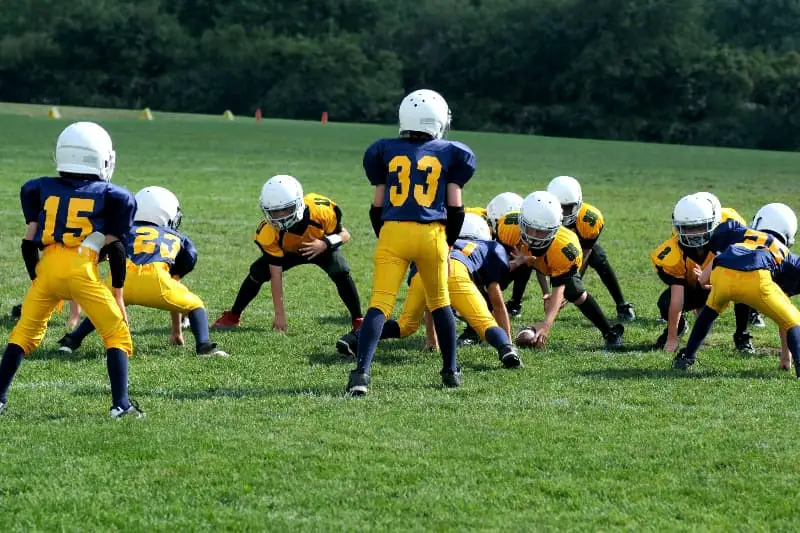
Obtaining a Certification
Any person commencing coaching youth football should start with a certification. Most occupations that include working with children requires some form of certification, though the specifics vary from state to state.
For example:
- The California Interscholastic Federation requires a general coaching certification, a sports concussion certification, a cardiac arrest certification, as well as certifications for first aid, heat safety and CPR.
- Texas has an entire Coaching Certification Program, with a special module for football about safe tackling
- It is important to research the state you would like to coach in for the specific requirements
- Most courses cost between $30 – $70
Be sure to check out the requirements in your area and ask your fellow coaches / connections on the best way to obtain the relevant certification for the level you are looking to coach.
However, knowing how to structure valuable practices, plan for a season, interact with parents and athletes, as well as conduct yourself as a leader on and off the field are all necessary components of coaching that may not necessarily come with just obtaining a certification.
How to Get a Job as a Football Coach
You’ve got the certifications, you’ve got some experience. Now it’s time to take on a team of your own and lead them to victory! But how?
Personal connections are a great place to start. Remember those coaches you shadowed or teams you were an assistant coach on? There you go.
Never be afraid to ask. Coaching positions pop up all the time, and typically coaching communities are pretty tight. Any football coach you know will at least be able to point you in the right direction.
Don’t be worried if you don’t have a personal network in the coaching community. Everyone has to start somewhere.
Begin with a Google search of schools or organizations in your area. If you have the right certifications and a bit of experience, it shouldn’t be too difficult to find an open job.
One caveat here: job postings are typically more competitive. If you’re just starting out, research organizations in your area and reach out directly.
Doing so will also put you on their shortlist, so even if a job is not available now you’ll be kept in mind for future openings.
Also, join any Facebook pages or networking groups for coaches in your area. These are typically the first places that jobs are posted, as organizations feel more comfortable hiring off a reference than openly on the internet, especially youth coaching positions.
Finding a position is only the beginning of your journey. Once you have a team, the real adventure begins!
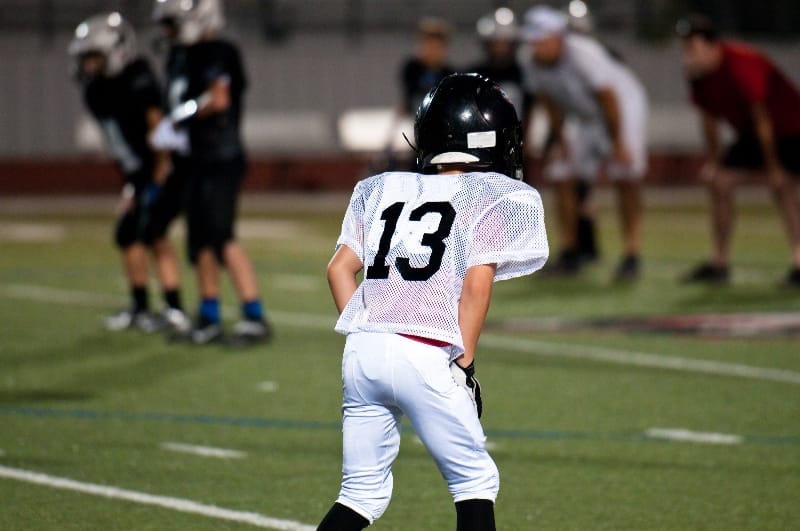
Starting Off Strong
You never get a second chance to make a first impression.
Meeting your team for the first time can set the tone for the rest of the season, so it’s important to come prepared. A great first impression can leave them feeling excited and inspired, whereas a poor first impression means you’ll be fighting an uphill battle all season.
Before ever stepping foot on the field, host a team meeting.
Invite the athletes and their parents to come, and connect with them. Your team is a small community, and everyone has a part to play. You are their leader, and it’s important to let everyone know what they can expect.
Related: The Complete Coaches Guide to Building Team Culture In Sport
Why We Play the Game
Parents can be your best friend or your worst enemy. It’s important that you set the tone, and get them on side. The easiest way to do this is by letting them know that you actually care about their kids.
Football isn’t just about winning and losing. It’s about building character. It’s about working together as a team, not simply as individuals. It’s about being humble in victory, and gracious in defeat.
Every team has a loss at some point. The great teams are the ones that never give up, that pull together and learn from their mistakes, coming back even stronger.
These lessons transcend football. If young athletes can learn them on the field, they can apply them in all aspects of their life and find success in whatever they do.
For younger athletes, this may go a bit over their head but it will resonate with the parents and let them know that you’re here for the right reasons.
Related: Is Youth Sports Too Intense? A Message For Our Coaches
Rules and Expectations
Getting everyone on board with your rules and expectations is another essential first step.
By setting the tone early and laying everything out, you prevent any confusion and have something to fall back on later in the season.
Try creating a team contract. List out the rules and expectations, things like:
- Always be on time for practice and games, or let coach know if you can’t.
- Treat your teammates and opponents with respect.
- Listen to coaches and referees.
- Bring all of your equipment to every game and practice
- Always give 100% effort.
Allow your athletes and parents to look over the rules and expectations, and ask any questions they might have. Explain why these things are important, even to kids. You’d be surprised what they can understand.
Like any contract, if everything looks good they can sign it. This gives you something to fall back on. If an athlete stops giving 100% or talks back to a ref, you can remind him what he agreed to at the beginning of the season.
A contract system also helps teach young athletes the importance of keeping their word!
Related: What are the Challenges of Coaching Youth Sports?
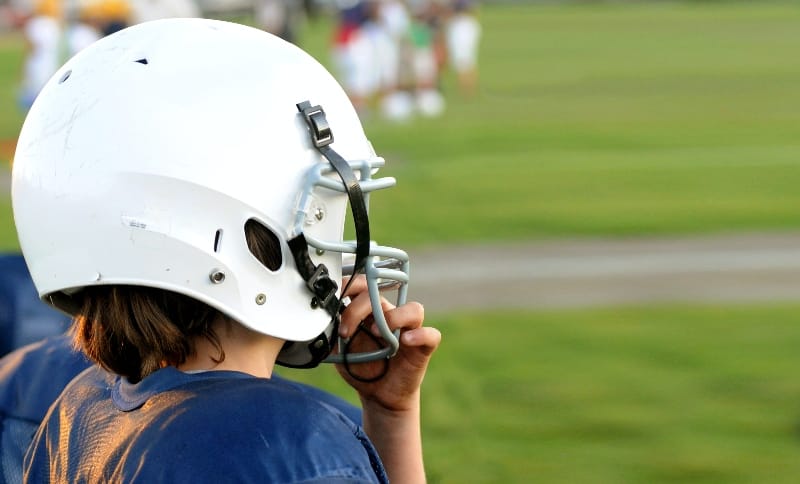
How to Plan Football Practices
Now that everyone is on the same page, it’s time to play some football!
Here is where the fun begins, and when you truly begin your full responsibilities as a coach. Structuring your practices will determine how much your team grows and how they perform throughout the season.
Football is an aggressive sport that can take a toll on the body. It’s essential to know how to structure practices so that your athletes can grow and improve, while at the same time preventing injury.
The Warmup
Always begin with a warmup!
Warming up first is a rule for any athletic activity, the human body needs to warm up before being pushed or you can risk serious injury.
Related: The Complete Coaches Guide to Youth Sports Injuries
If you have team captains, let them lead the team in warmups. Otherwise, you can lead them yourself. A good warmup usually consists of:
- 1 easy lap around the field
- Dynamic stretching exercises for the whole body
- Arm circles
- Jumping jacks
- High knees
- Glute kicks
- Walking lunges
- Frankenstein kicks
Dynamic stretches (moving) have been shown to both improve performance and decrease the chance of injury as opposed to static (hold) stretching.
Running Through Plays
Once your team is warmed up, but before they are tired, you should run through any new plays. If they are still learning the offense or defensive formations, this is a critical stage of practice.
They need to be able to run through these plays in their sleep. If they can’t, then when the chaos of full contact begins they will be running in circles.
Work for around 15 – 20 minutes on these plays and formations. For offense, have them run through the plays, and have the defense practice getting into different sets quickly.
You could also train the defense during this time. Don’t reveal the offensive play, but once the offense is set have the defense try to guess the play (run or pass) and get into the correct formation to stop it.
However, do not let them make contact here. These are non-contact run-throughs to get used to the formations.
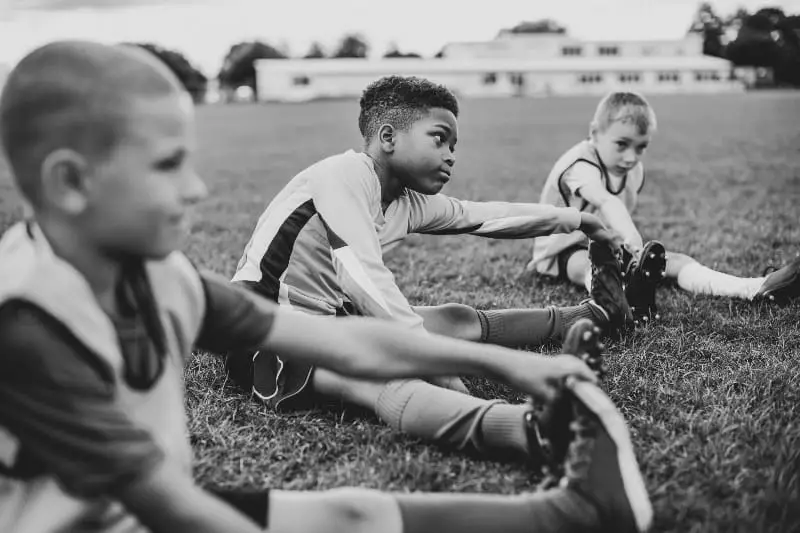
Conditioning
You want to do conditioning early on in practice. This will prepare your team for the second half of the game, to still be able to compete when they’re already tired.
Football is a physically demanding sport, and your conditioning will prepare them for it.
Run them through speed and agility workouts, strength workouts such as pushups, and condition them with sprints, bear crawls, and more.
Get creative and mix things up! Incorporate yoga, plyometrics, calisthenics, and scour the internet for conditioning drills.
One of the greatest quotes regarding conditioning came from antiquity, the ancient Spartans…
“Sweat more in training, bleed less in war.”*
*Note – the above is a metaphor and should not be taken literally when coaching children!
Individual Position Technique Training
Now that the team is exhausted, it’s time to get to work!
Break them into their respective positions and give each of them drills to run.
Quarterbacks, receivers, and running backs can practice running routes and other offensive sets.
For more specific skill development, try the following:
- Quarterbacks can practice taking snaps, play recognition, and moving in the pocket
- Running Backs can develop their speed and agility with ladders and various movement drills
- Receivers should not only practice running and catching, but blocking as well.
Linemen, both defensive and offensive, can run through blocking and engagement drills such as 1 on 1 pass rush, sled drills, and block recognition drills.
Defensive backs in youth football will probably double as receivers and running backs. Try working both offense and defense.
For example, 1 on 1 routes are a great way for athletes to practice on both offense and defense.

Game Situations and Team Drills
Here is where we prepare for game time!
Have the team run through various scenarios or situations they might run into during a game. Go full speed, but emphasize that we’re playing touch football, not full contact.
This is a chance for your athletes to use what they just practiced, but going full speed and with someone in their face. They should also be relatively tired at this point, simulating a game experience.
Game situations bring everything together, and help your team to execute while in the heat of competition.
Don’t be afraid to stop the plays and correct mistakes, that’s the whole point. This is an opportunity to go full speed, but also pull back and teach if something isn’t right.
Jot down notes of common mistakes or technique deficiencies, and these will provide direction for the drills in your next practice.
Cool Down
Again, football is physically intensive. Many coaches don’t take advantage of the cooldown period which is a mistake.
This could be as simple as jogging through some plays, letting your players get in extra reps at a leisurely pace while their body recovers.
After a strenuous practice, you might also want to include some cooldown stretching. If you have the equipment you could also try ice baths! These are excellent for recovery and for pushing mental toughness.
If you’re wondering how an ice bath builds toughness, try getting in one and see for yourself!
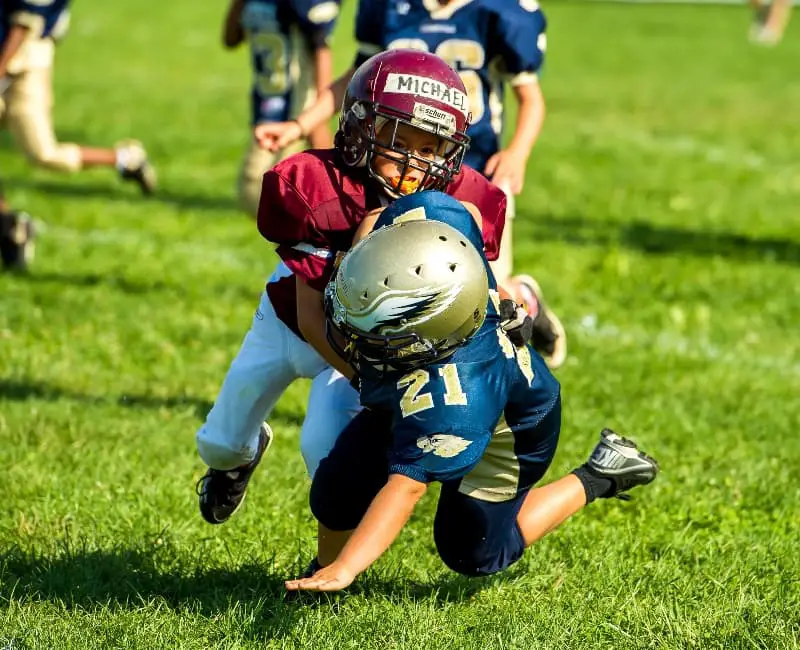
Coaching on Gameday
Due to the nature of the game, football coaches are engaged in many aspects of each contest. As a result, you need to have a game plan ready for each game in order to excel as a coach at any level.
Preparing for the Game
There are several things to consider, and run through in practice, leading up to a game.
The first is your offensive strategy. Are you going to focus on the run game, or try it through the air. This depends on several factors: the ability of your quarterbacks, running backs, and receivers, as well as the preferences and ability of the other teams’ defense.
If they’re good at stopping the run, throw. If their coverage is strong, put it on the ground and pound them with the run.
Next, plan your defense. Any information about the other teams’ preferences can help out here. If they are strong in the passing game, practice your coverage and be ready to cover the pass. If they prefer to run, get your team ready for a physical contest.
You’ll also want to work on game-specific scenarios. What will you do on 3rd and one yard to go? What is your goal-line defense? What range is your kicker comfortable attempting a field goal.
These are all things you’ll want to know before the game starts.
Coaching Football Games
Coaching football games is both an art and a science. We’ll outline some important aspects, then as you gain more experience you’ll develop your own routines and strategies.
Warmup
Warmups before games are even more important than practice.
This is the big show – what they practiced all week for. If you’ve set your team up with the right mindset, they’ll be going 100% during the game. As such their bodies need to be warmed up and ready to go.
Have them run through similar warmup routines as they do in practice, the consistency and familiarity will help calm their nerves. However, make sure to go around and check that nobody is slouching.
Also, use this time to remind them about the strategy and what you worked in during practice all week.
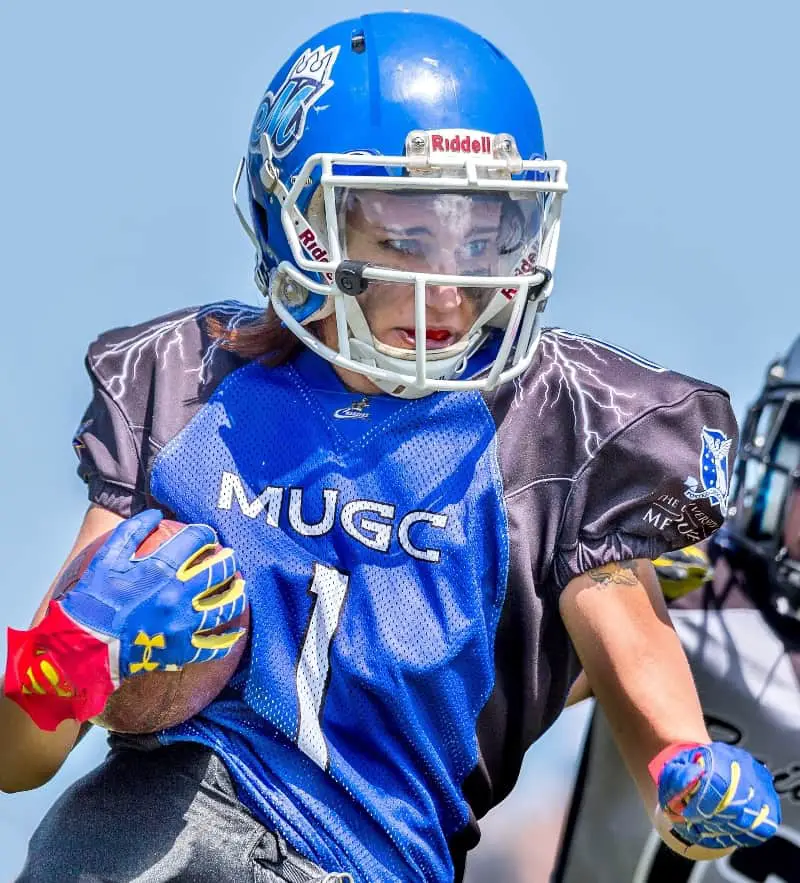
During the Game
Coaching during the game is a balance of short-term and long-term goals.
Obviously, the short-term goal is to win the game. That’s the goal of every game, and it would be insane to do anything except try to win.
That being said, winning isn’t everything. Sometimes it’s more important for athletes to learn, potentially face adversity, or practice something specific.
For example, maybe you have a strong running game but want to develop your passing game more. It may hurt your chances of winning one individual game to focus on passing, but doing so can develop a wider offensive arsenal and set you up for more wins in the future.
Talk it out with other coaches, and with your team as well. Let them know why you’re doing what you do, and get their input. The coach is the leader, but sometimes the lineman or cornerbacks can see things you can’t.
After the Game
No matter the result, sportsmanship should always be the focus after the game.
Always shake the other teams’ hands and congratulate them. It doesn’t matter if you won by 50 or got blown out, always shake hands.
This teaches your team to be humble in victory and composed in defeat. This is one of those things that transcends the sport itself. This is a life lesson moment.
Finally, have them huddle around you before going home. Have the players take a knee as you address them with your thoughts on the game.
This should be brief, no longer than 5 minutes. But let them know how they did. If you won, let them know what they did well and congratulate them. If you lost, coach them on how to learn from failure and let them know you’ll come back even stronger!
Player Safety
One last very important point before we wrap things up. Football is a game full of physical contact. As a result, player safety should be highly emphasized in every single practice and game.
Keep these things in mind to make sure your players are safe and healthy all season:
- Never let players practice or play without all of the necessary safety equipment. This includes:
- Helmet
- Shoulder pads
- Thigh and knee pads
- Mouthguard
- Compression shorts or jockstrap
- Check the quality of your players’ equipment regularly, making sure all of it is solid and up to date.
- Teach players proper tackling technique. They should never lead with the head, and should drill the correct techniques until they become second-nature.
- Avoid full contact as much as possible in practice. You can, and should, hit during certain drills, but these should be brief and highly focused.
- If you think a player could possibly have a concussion, even the slightest possible chance, pull them from the game or practice.
- Always punish improper conduct. If athletes are deliberately hitting incorrectly or doing things that could lead to injury, tell them why they are being punished. Have them run a few miles or do 500 pushups – you’ll see the actions change very quickly.
Following these guidelines will ensure that your team builds safe habits, and your players stay healthy (where possible) throughout the length of the season!
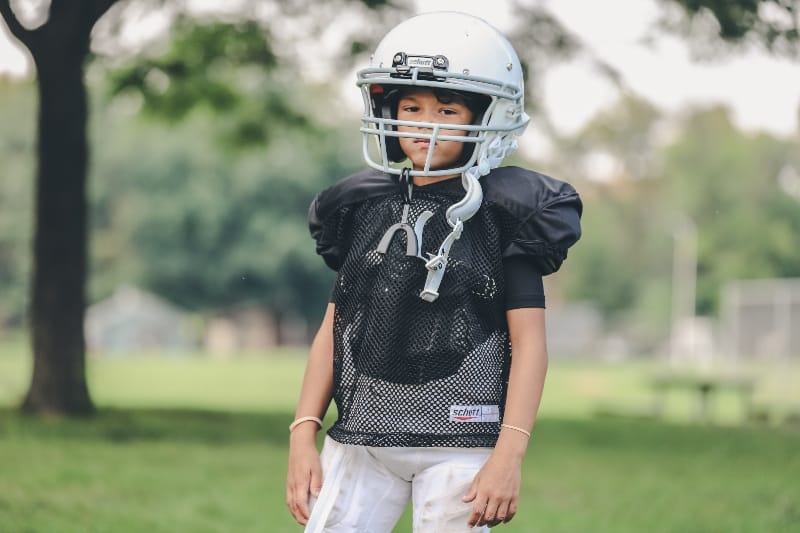
Final Thoughts: How to Become A Successful Youth Football
Being a football coach is an incredible experience. Few sports allow the coach as much engagement, and as much opportunity to impact young lives in a positive way.
Football has paved the way for many great CEOs and leaders, and has helped keep kids off the streets and engaged in something bigger than themselves. This great sport is an integral part of American culture, and coaches have the privilege of carrying on those traditions.
Now it’s your turn.
With the right information, certification, preparation and inspiration, it’s time to become a great coach in your own right!
Daniel

